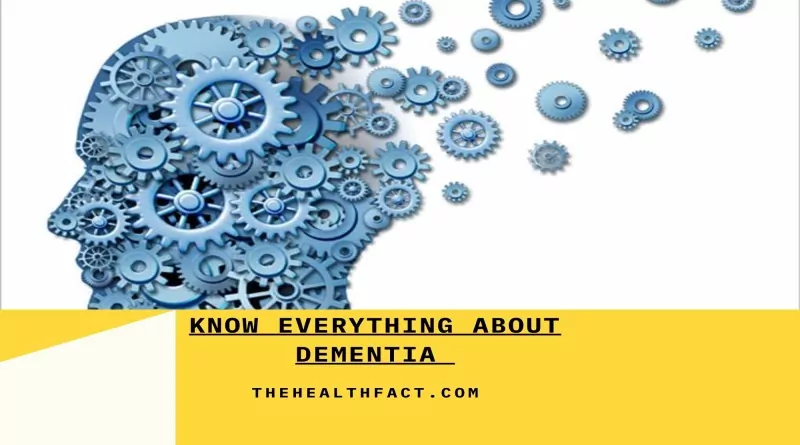Dementia: Causes| Symptoms| Types| Testing| Treatment
Table of Contents
Overview
Dementia is a term used to describe various symptoms of cognitive declines, such as forgetfulness. It is a symptom of many underlying diseases and other brain disorders. Dementia is not a disease at all in itself but it is a basic term to describe symptoms of impairment in memory, communication, illness, and thinking.
While the likelihood of dementia increases with the number of ages, it is not a normal part of aging.
Dementia may affect:
- Memory
- Thinking
- Language
- Judgment
- Behavior
Some dementia is progressive. This means that they worsen over time. Some dementia is also treatable or reversible. Some experts limit the term dementia to irreversible mental decline. Alzheimer’s disease is the most common cause of progressive dementia in older adults.
Causes
Dementia is brought about by harm to or loss of nerve cells and their associations in the mind. Contingent upon the space of the mind that is influenced by the harm, dementia can influence individuals diversely and cause various side effects.
Dementias are frequently gathered by what they share, for example, the protein or proteins kept in the cerebrum or the piece of the mind that is influenced. موقع مراهنات عربي A few infections look like dementia, for example, those brought about by a response to meds or nutrient lack, and they may improve with treatment.
Progressive Dementias
Kinds of dementias that advancement progress and aren’t reversible include-
Alzheimer’s disease– Alzheimer’s disease is the most common cause of dementia. Although not all causes of Alzheimer’s disease are known, experts are aware that a small percentage is related to mutations of three genes, which can be passed from parent to child. While many different genes are likely involved in Alzheimer’s disease, an important gene that increases the risk is apolipoprotein E4 (apoE).
Plaques and tangles occur in the brains of patients with Alzheimer’s disease. Plaques are clusters of proteins called beta-amyloid, and tangles are fibrous tangles made of tau proteins. These flakes are believed to damage healthy neurons and the fibers connecting them. Other genetic factors may make it more likely that people will develop Alzheimer’s.
Vascular dementia- This is the second most common and normal type of dementia caused due to damage to the blood supply vessels to your brain. Blood vessel problems can cause stroke or damage the brain in other ways, such as damage to the fibers in the brain’s white matter. The most common symptoms of vascular dementia include problem-solving, slow thinking, attention, and difficulties with the organization. These are more noticeable than memory loss.
Lewy body dementia- Lewy bodies are unusual balloonlike clusters of protein that have been found in the minds of individuals with Lewy body dementia, Alzheimer’s infection, and Parkinson’s sickness. This is one of the more normal kinds of reformist dementia.
Normal signs and indications remember showcasing one’s fantasies for rest, seeing things that aren’t there (visual pipedreams), and issues with center and consideration. Different signs incorporate ungraceful or sluggish development, quakes, and unbending nature (parkinsonism).
Frontotemporal dementia- It is a group of diseases characterized by the breakdown (degeneration) of nerve cells and their connections in the frontal and temporal lobes of the brain, which are areas commonly associated with personality, behavior, and language. Common traits affect behavior, personality, thinking, judgment and language, and speed.
Mixed dementia- Brain autopsy studies of people age 80 and older indicated that several people had a combination of multiple causes such as Alzheimer’s disease, vascular dementia, and Lewy body dementia. Studies are underway to determine how mixed dementia affects symptoms and treatments.
Dementia-like Conditions That Can Be Reversed
A few reasons for dementia or dementia-like symptoms can be reversed with treatment. They include-
Infections and immune disorders- Dementia-like symptoms can result from fever or other side effects of your body’s attempt to fight off an infection. Numerous sclerosis and different conditions brought about by the body’s immune system attacking nerve cells also can cause dementia.
Metabolic issues and endocrine abnormalities- Individuals with thyroid issues, low glucose/blood sugar (hypoglycemia), excessively little or a lot of sodium or calcium, or problems and issues absorbing vitamin B-12 can develop symptoms or other personality changes.
Dietary insufficiencies- Not drinking enough fluids (lack of hydration); not getting sufficient thiamin (nutrient B-1), which is regular in individuals with constant liquor addiction; and not getting enough nutrients B-6 and B-12 in your eating regimen can cause indications. Copper and nutrient E insufficiencies likewise can cause dementia manifestations.
Medicine results- Results of prescriptions, a response to a medicine, or an association of a few meds can cause indications.
Subdural hematomas- Bleeding between the surface of the brain and the covering over the brain, which is common in the elderly after a fall, can cause symptoms like those this.
Poisoning- Exposure to heavy metals like lead, and different toxins, like pesticides, also, the use of a recreational drug or heavy alcohol can cause symptoms of dementia. Symptoms can be cured by treatment.
Brain tumors- Infrequently, dementia can result from damage caused by a brain tumor.
Anoxia– This condition, likewise called hypoxia, happens when organ tissues aren’t getting sufficient oxygen. Anoxia can happen because of serious sleep apneas, asthma, heart attack, carbon monoxide poisoning, or other causes.
Normal Pressure Hydrosyphlus- This condition, is caused by enlarged ventricles in the brain, can cause problems with walking, urinary difficulty, and memory loss.
Symptoms
The symptoms of dementia vary depending on the cause, but common signs and symptoms include-
- Short-term memory problems.
- Forgetting where you put something or asking the same question over and over again.
- Communication problems.
- Getting lost somewhere.
- The trouble with complex but familiar tasks, such as fixing meals or paying bills.
- Personality changes.
- Depression, Agitation, Paranoia.
- Mood Swings and Lack of Interest. العاب كازينو مجاني
- Memory Loss.
- Confusion and disorientation.
- Difficulty in completing everyday tasks.
- Paying Bills.
Dementia Stages
There are 4 Dementia stages-
1- Mild cognitive impairment
Characterized by general forgetfulness. It affects many people as they age but it turns into dementia for only a few.
2- Mild dementia
People suffering from mild will experience cognitive impairment that sometimes affects their daily lives. Symptoms include memory loss, confusion, personality changes, being lost, and difficulty planning and performing tasks.
3- Moderate dementia
Daily life becomes more challenging, and the person may need more help. Symptoms are similar to the mild one but are exacerbated. Individuals may need help wearing clothes and combing their hair. They can also show significant personality changes; For example, being suspicious or agitated without any reason. There is also a possibility of sleep disturbances. كيفية لعب القمار
4- Severe dementia
At this severe stage, the symptoms have worsened considerably. There may be a loss of ability to communicate, and the person may need full-time care. Simple tasks, such as sitting and raising the head, become impossible. Bladder control may be lost.
Types
Dementia can be split into two types of groups based on which part of the brain is affected-
Cortical dementia
It is caused by problems in the cerebral cortex, the outer layer of the brain. They play an important role in memory and language. Individuals with this type usually have severe memory loss and cannot remember words or understand language. Alzheimer’s and Krutzfeldt-Jacob’s disease are two forms of cortical dementia.
Subcortical dementia
It occurs due to problems in parts of the brain below the cortex. People with subcortical dementia show a change in their speed of thinking and ability to initiate activities. Typically, people with subcortical dementia do not have amnesia and language problems. Parkinson’s disease, Huntington’s disease, and HIV can cause this type of dementia.
Early Signs Of Dementia
- Changes in short-term memory.
- Changes in mindset.
- Inconvenience tracking down the correct words.
- Apathy kind of feeling
- Being repetitive.
- Finds it hard to follow a storyline.
- Inconvenience finishing regular tasks.
- Poor sense of direction.
- Trouble adjusting to changes.
Dementia Testing
Not a single test can confirm the dementia diagnosis. Instead, a health care provider will use a series of tests and examinations. It includes-
- A complete medical history
- A careful physical examination
- Laboratory tests including blood tests
- Review of symptoms including changes in memory, behavior, and brain function review
- Complete family history
Doctors may determine if you or someone you love is experiencing symptoms and indications of it with a high degree of certainty. However, they may not be able to determine the exact kind of dementia. In many cases, symptoms of it type overlap. This makes it difficult to distinguish between the two types.
Some health care providers will diagnose dementia without specifying the type. In that case, you may want to see a doctor who specializes in diagnosing and treating dementia. These doctors are called neurologists. Some geriatricians are also experts in this type of diagnosis.
Risk Factors
Risk factors related to Dementia that can’t be changed:-
Age- The risk increases with your age, especially after age 65. However, dementia is not a normal part of aging, and dementia can occur in young people.
Family ancestry- Having a family background of dementia puts you in more danger of fostering the condition. In any case, numerous individuals with a family ancestry never develop symptoms, and numerous individuals without a family ancestry do. There are tests to decide if you have certain hereditary changes.
Down syndrome- By middle age, Alzheimer’s disease starts early in many people with Down syndrome
Risk factors related to Dementia that can be changed
Diet and exercise- Examination suggests that the absence of activity increases the risk of dementia. And keeping in mind that no particular diet is known to reduce the risk of dementia, research shows a more prominent rate of dementia in individuals who eat the opposite of an undesirable eating routine and those who eat in the Mediterranean Follows a style diet that is rich in yield, whole grain, nuts, and seeds.
Heavy alcohol use- If you drink too much alcohol, you may be at greater risk of dementia. While some examinations have shown that moderate measures of alcoholism may have a protective effect, the results are conflicting. The relationship between moderate measures of alcoholism and the risk of dementia is not known with certainty.
Cardiovascular risk factors. These include (high blood pressure), increased cholesterol, increased fat in your veins (atherosclerosis), and weight gain.
Depression- Although not well understood yet, late-life depression may indicate the development of dementia.
Diabetes- Diabetes may increase your risk of dementia, especially if it’s poorly controlled.
Smoking- Smoking may increase your risk of growing dementia and blood vessel (vascular) diseases.
Sleep apnea- People who snore and have episodes where they often stop breathing while sleeping may have memory loss.
Vitamin and nutritional deficiencies- Low levels of vitamin D, vitamin B-6, vitamin B-12, and folate may expand your danger of dementia.
Prevention
Preventing all these risk factors can help you to stay away from Dementia-
Certain danger factors are known to be related to dementia. Be that as it may, age is the greatest indicator. Other danger factors include:
- Smoking and liquor use.
- Atherosclerosis (cardiovascular disease causing the arteries to narrow).
- lack of education
- midlife hypertension
- High levels of “bad” cholesterol (low-density lipoprotein).
- obesity
- Above-average blood levels of homocysteine (a type of amino acid).
- Diabetes.
- Gentle psychological weakness can in some cases, however not generally, lead to dementia.
Treatment
Two primary treatments are used to reduce the symptoms of dementia: drug and non-drug treatment. Not all medications are approved for each type of dementia, and no treatment is a cure
Medications
Two types of medication are used to treat symptoms of Alzheimer’s disease:
Cholinesterase inhibitors- These drugs increase a chemical called acetylcholine. This chemical can help in making memories and improving decisions. It can also delay worsening symptoms of Alzheimer’s disease (AD).
Memantine- This medicine is used to delay the onset of cognitive and behavioral symptoms in people with moderate or severe AD. This may let others allow people with AD to maintain normal mental functions for a longer period of time.
These two drugs can also be prescribed together. There can be side effects, so learn more about the possible complications of all these kinds of medications.
Non-drug therapies
These treatments can help reduce symptoms of dementia and some manageable complications of the disease. Common non-drug treatments for dementia include:
Modifying your environment- Clutter, noise, and excessive stimulation can reduce focus. Modifying Common Functions. You can work with a physician or other health care provider to divide daily tasks, such as bathing or grooming, into manageable tasks.
Occupational therapy- These specialized health care providers can assist you to learn how to be safer and more secure with tasks including walking, cooking, and driving.
Conclusion
Dementia is used to denote the number of cognitive problems such as forgetfulness or changes in behavior. Although, not all conditions which resemble the symptoms of dementia are dementia. usually, it results due to damage to the nerve cells or to the proteins of the brain. Alzheimer’s disease is the most common cause of it. however, the exact cause of Alzheimer’s disease is not known yet. the good thing is it can be treatable and preventable with drugs and adapting a good lifestyle by discarding bad habits.



